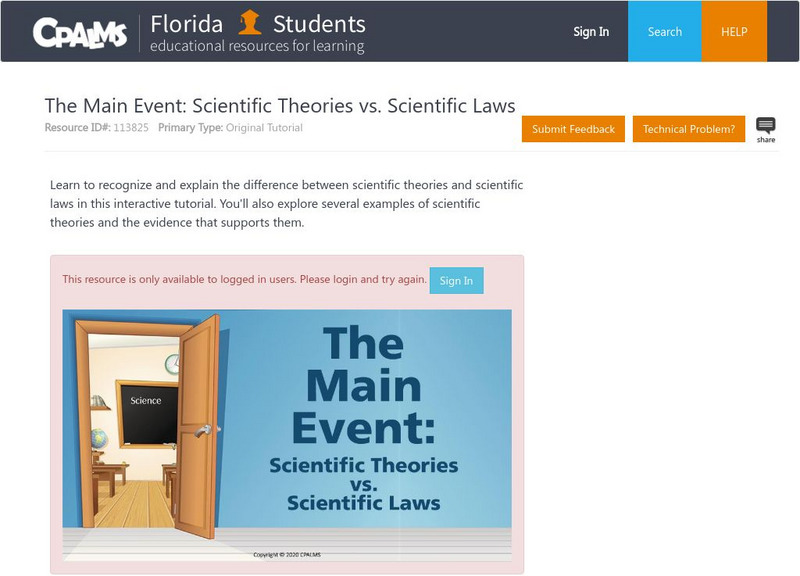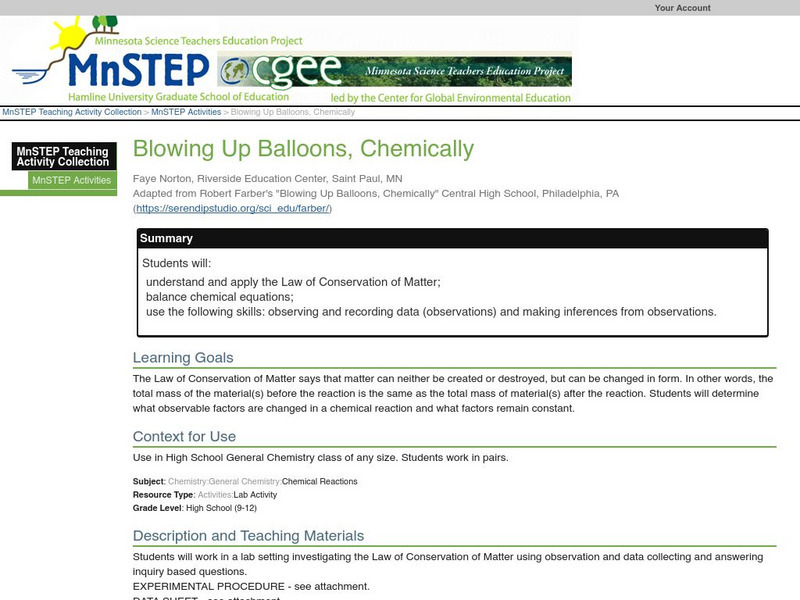Hi, what do you want to do?
Curated OER
Acid Rain: An Air Pollutant
Fifth graders participate in an experiment in which they examine the effects of acid rain on buildings. They discover how huge a problem acid rain is not only to structures but to the environment. They gather pictures of acid rain to...
Curated OER
Investigation of Timbre
Students design an experiment to analyze the timbre of different instruments. In this physics lesson, students analyze the missing quality in sound. They discuss their results in class.
Curated OER
How Can You Study Things You Can’t See Like: Atoms?
Students simulate how scientists studied things they can't see like atoms. In this chemistry lesson, students predict what is inside the numbered obsertainers. They design a way to investigate what's inside without opening it.
National Geographic
National Geographic: Observing Physical and Cultural Landscapes
In this lesson, students examine photographs of Europe as they learn to distinguish between physical and cultural characteristics of a landscape, and make observations and inferences about the places and people in the photographs. They...
Texas Education Agency
Texas Gateway: Question and Purpose
This tutorial reviews over making observations to form questions and purpose for a lab experiment.
National Endowment for the Humanities
Neh: Edsit Ement: Fable and Trickster Tales Around the World
The lessons presented in this website "introduce children to folk tales" and how these folktales are changed and affected by generational and cultural values. Includes several links to further related information on folktales, fables,...
Curated OER
Mc Graw Hill: 4th Grade Use Details and Examples
This reference from the McGraw-Hill CCCS Literacy eHandbook discusses the importance of recalling explicit details. The importance of inferencing skills with a how-to graphic organizer for making inferences are included. Students may...
Quizlet
Quizlet: Making Observations and Inferences Test
A test with four multiple choice questions over inferencing, quantitative observation, and qualitative observation.
Quizlet
Quizlet: 5th Grade: Observation vs. Inference Proficient: Test
This interactive assessment features 6 multiple-choice questions over the terms observation, inference, and prediction with their definitions and examples.
Quizlet
Quizlet: 5th Grade: Observation vs. Inference Proficient: Match
In this interactive game, students match the terms observation, inference, and prediction with their definitions and examples.
CPALMS
Florida State University Cpalms: Florida Students: Observation vs. Inference
A tutorial that explores the differences between scientific observation and scientific inference.
Huntington Library
Huntington Library: Learning From Leaves: From Observation to Inference [Pdf]
A lesson plan in which learners explore plants from three different ecosystems and make inferences about plant structures and their environments. Includes discussion questions, a vocabulary glossary, and handouts.
Science Education Resource Center at Carleton College
Serc: Floating Foods and Underwater Eruptions: An Exploration of Density
Students explore the concept of density by investigating how several solids and liquids interact. Through hands-on activities and a teacher demonstration, they develop a greater understanding of density by using their observational...
CPALMS
Florida State University Cpalms: Florida Students: Scientific Laws and Theories
Differentiate between scientific laws and theories. Identify examples of scientific theories and use evidence to support them.
Texas Education Agency
Texas Gateway: Descriptive vs. Comparative Investigations
In the following lesson students will learn the differences between descriptive and comparative investigations.
Quizlet
Quizlet: 5th Grade: Observation vs. Inference: Proficient: Flashcards
This set of interactive flashcards focuses on observation and inference. It provides a list of terms with definitions and some examples.
Utah Education Network
Uen: Chances With Wolves
This lesson engages students in learning the differences among observations, facts, and inferences. Students will study about the reintroduction of wolves into the Rocky Mountain and Yellowstone Region. Students will work in small groups...
National Endowment for the Humanities
Neh: Edsit Ement: Emily Dickinson & Poetic Imagination: "Leap, Plashless"
This lesson introduces students to Emily Dickinson's poetry which often reveals a child-like fascination with the natural world. Students examine how she writes perceptively of butterflies, birds, and bats and uses lucid metaphors to...
Science Education Resource Center at Carleton College
Serc: Investigating the Difference in Geology
In this inquiry based field investigation, students will be observing our school campus's topography, soil, and plants and comparing them with the Fertile sand dunes' topography, soil, and plants. They will make detailed observations and...
Science Education Resource Center at Carleton College
Serc: Investigating South Crow River: Discharge, Turbidity, Erosion, Sediments
In this field investigation, small groups of learners will observe and measure characteristics of the South Crow River near Mayer, Minnesota. Data collection on these characteristics will include but not be limited to: speed of current...
National Institutes of Health
Alcohol: Separating Fact From Fiction
Learners can use this site to observe the effects of alcohol on mice and discuss the ways in which alcohol harms and impairs the body. An online instructional activity, "Alcohol; Separating Fact From Fiction," has students watch video...
University of California
University of California at Berkeley: Understanding Science: Mystery Boxes
An interesting lesson plan where students collaborate to create a visual image of what the inside of a sealed box looks like. The box has a marble or other type of sphere inside it, as well as partitions and/or ramps. Students come to...
Other
Catching Sunshine
Teachers can enroll their class in this online 'Science-athon.' Students design and build a solar collector, and over a period of several days, collect data and enter it into an online database.
Science Education Resource Center at Carleton College
Serc: Blowing Up Balloons, Chemically
Students will understand and apply the Law of Conservation of Matter; balance chemical equations; use the following skills: observing and recording data (observations) and making inferences from observations.
















![Huntington Library: Learning From Leaves: From Observation to Inference [Pdf] Lesson Plan Huntington Library: Learning From Leaves: From Observation to Inference [Pdf] Lesson Plan](https://static.lp.lexp.cloud/images/attachment_defaults/resource/large/FPO-knovation.png)









